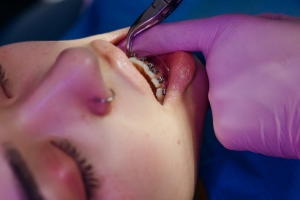When most people think about oral care, the first instinct is to reach for a toothbrush. And yes, brushing is essential, but healthy gums demand more than two minutes twice a day. That's why many who experience early gum sensitivity or mild recession look for supportive products like the best toothpaste for sensitive teeth and receding gums to strengthen their daily routine. Yet the real secret to lasting gum health lies in consistent habits that extend far beyond the bathroom sink.
Healthy gums are built on small daily rituals, the way you eat, drink, sleep, breathe, and even manage stress. Here's how to protect your smile from the inside out.
Hydration: The Simplest Defense Against Gum Decline
It's easy to underestimate how crucial hydration is for oral health. Your mouth relies on saliva to neutralize acids, wash away debris, and deliver minerals to your teeth and gums. When you're dehydrated, saliva production drops, allowing harmful bacteria to thrive and irritate gum tissue.
Make it a ritual to start your morning and end your day with a glass of water. Keep a refillable bottle nearby throughout the day, especially if you consume coffee, tea, or alcohol, which can dry the mouth. Herbal teas, cucumber-infused water, and sugar-free electrolyte drinks can also help maintain hydration without harming enamel.
Mindful Eating: Feeding Your Gums Nutrients, Not Sugar
Your gums are living tissue, and like the rest of your body, they respond to nutrition. Vitamin C supports collagen production, the foundation that keeps gums firm. Vitamin D improves calcium absorption, strengthening the bone beneath your teeth. Omega-3 fatty acids found in fish, flaxseed, and walnuts reduce inflammation that leads to gum tenderness.
Swap out processed snacks for crunchy fruits and vegetables like apples, carrots, and celery. Not only do they stimulate saliva flow, but their natural texture helps clean the gum line. Avoid sticky sweets or frequent sipping of sugary beverages, every exposure feeds bacteria that attack gum tissue.
A 2023 study published by the American Dental Association emphasizes that a balanced diet rich in antioxidants can reduce the markers of gum inflammation and improve periodontal healing outcomes.
Gentle Flossing: The Unsung Hero of Gum Health

Flossing isn’t just for removing food particles; it disrupts the bacterial biofilm that causes gum disease. The trick is gentleness. Forceful or erratic flossing can injure delicate gum tissue. Wrap the floss in a C-shape against each tooth and glide it slowly under the gum line.
If traditional floss feels cumbersome, try interdental brushes or water flossers. The goal is consistency, once a day is enough to keep bacterial buildup under control. Think of it as a short act of self-care, not a chore.
The Power of Breathing (Yes, Really)
Breathing through the nose instead of the mouth is more important for gum health than most people realize. Chronic mouth breathing dries the oral tissues, reducing the saliva that keeps the gums lubricated and protected.
If you wake up with a dry mouth, snore frequently, or notice gum tenderness in the morning, mouth breathing might be the culprit. Try nose-breathing exercises or gentle tape techniques (approved by your doctor) at night to retrain your airflow. The improvement in gum comfort and freshness can be surprisingly fast.
Manage Stress to Protect Your Smile
Stress triggers inflammation throughout the body, and the gums are no exception. When you’re stressed, the immune system becomes less effective at controlling the bacteria that cause gum disease. It’s one reason people under chronic stress may experience bleeding gums even with good hygiene.
Building calm into your day can be as simple as:
- A five-minute morning meditation
- Stretching before bed
- Short outdoor walks between tasks
- Keeping your phone out of reach during meals
These small pauses lower cortisol levels, helping your body fight inflammation and protect the delicate tissues around your teeth.
Quality Sleep: Your Overnight Repair Cycle
Sleep isn’t just for your brain; it’s when your entire body, gums included, regenerates. Poor sleep or sleep apnea can increase gum inflammation and slow healing. Maintaining a consistent bedtime and sleeping on your side (rather than your back) can improve airflow and reduce dryness.
If you grind your teeth, ask your dentist about a nightguard. Clenching increases pressure on gum ligaments, leading to micro-trauma and gradual recession.
Rethink Your Routine: Little Tweaks, Lasting Results
Building gum-friendly habits doesn’t require drastic change. A few mindful adjustments go a long way:
- Brush softly, using a small-headed toothbrush with gentle pressure, more force doesn’t mean more clean.
- Use an alcohol-free mouthwash; harsh formulas can strip protective enzymes and irritate tissue.
- Schedule dental cleanings every six months, even if you feel fine. Early intervention saves tissue before damage becomes visible.
- Monitor changes: if your gums look swollen, bleed often, or feel tender, don’t wait, gum disease progresses quietly but rapidly.
Beyond Brushing: A Lifestyle of Care
Strong gums aren’t built in a single day or by a single product. They’re the outcome of an overall lifestyle that values balance, hydration, nourishment, rest, and mindfulness. Daily rituals that promote well-being also strengthen your oral ecosystem.
So yes, brushing and flossing remain essential. But when you pair them with conscious living, eating well, managing stress, breathing correctly, and sleeping soundly, your gums respond in kind, staying resilient and pain-free for years to come.
A healthy smile, after all, is more than cosmetic. It’s one of the clearest reflections of how you care for your entire self, one daily ritual at a time.






